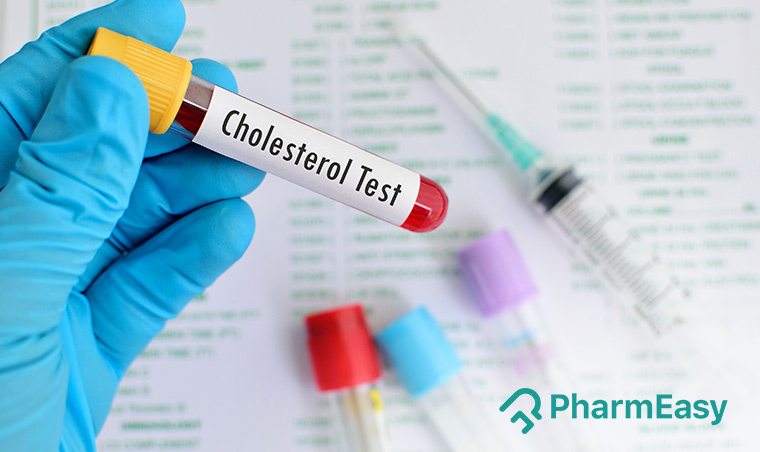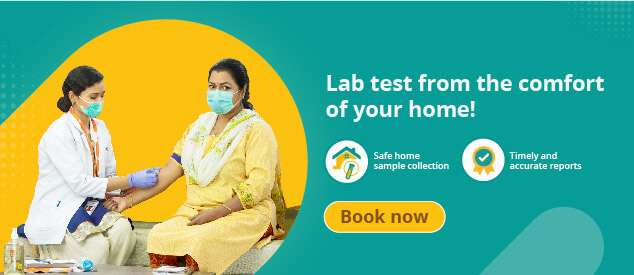Should You Be Worried About Your Cholesterol Levels?
By Dr. Nikita Toshi +2 more

Get,

to manage your symptom
Get your,


4 Cr+ families
benefitted

OTP sent to 9988776655



You’ve successfully subscribed to receive
doctor-approved tips on
Whatsapp

Get ready to feel your best.

Hi There,
Download the PharmEasy App now!!


Register to Avail the Offer
Send OTPBy continuing, you agree with our Privacy Policy and Terms and Conditions

Hi There,
Sign up on PharmEasy now!!
Trusted by 4 crore+ families

OTP sent to 9988776655



You have unlocked 25% off on medicines




Code: NU25
By Dr. Nikita Toshi +2 more
‘Cholesterol’ is a term that we all have heard of but most of us have a vague idea about what it really is. We all know that this term comes up when heart health is being discussed. But there is more to cholesterol than that. You might be wondering why you should bother learning more about it. The reason is, the right balance of cholesterol is crucial for your overall health, including, yes, your heart.
So let us find out more about cholesterol.

Table of Contents
Cholesterol is a wax-like substance that can be found in all the cells of the body. Cholesterol has received a lot of bad press because it is linked with heart disorders. But you probably didn’t know that cholesterol is essential to maintain the structure of the cells, for the synthesis of many hormones such as estrogen, testosterone, and adrenal, and for producing Vitamin D.
There are 2 sources of cholesterol – your liver and the foods that you consume. Did you know that your liver produces all the cholesterol that your body needs? The cholesterol found in foods is called dietary cholesterol. When you consume eggs, dairy products or meat, cholesterol enters your body from outside.
There are mainly two types of cholesterol- HDL and LDL. These are lipoproteins (lipids+proteins).
HDL – High-density lipoprotein or HDL is also called good cholesterol. HDL collects excess cholesterol from your body and transports it to the liver which breaks the cholesterol down and your body expels it. This means HDL can protect you from heart attacks and strokes.
LDL – Low-Density Lipoprotein is called bad cholesterol because when in excess, it leads to the build-up of fats in your blood vessels. This hardens and narrows your arteries, limits the passage of blood to your heart and other vital organs, eventually triggers damage of the heart’s muscles, heart attack or cardiac arrest.

Everyone should keep an eye on their cholesterol levels.
Why cholesterol test? We tend to eat a lot of unhealthy foods that increase LDL levels in our bodies. A cholesterol test should be part of your preventive healthcare check. Since heart disorders are being reported in people as young as 40, it is best to get tested as soon as you enter your 30s.
The cholesterol test is a simple blood test that is included in the lipid profile test that will measure the levels of HDL, LDL and triglycerides in your blood.
Healthy parameters of HDL and LDL:
| Men | Women | |
| Desirable levels of HDL | 60 mg/dL or above | 60 mg/dL or above |
| HDL levels that put you at risk | Less than 40 mg/dL | Less than 50 mg/dL |
| A safe level of LDL | Less than 100 mg/dL | Less than 100 mg/dL |
| Total cholesterol | |
| Acceptable | Less than 170 mg/dL |
| Borderline | 170 – 199 mg/dL |
| High | 200 mg/dL or more |
High levels of cortisol from chronic or long-term stress can cause high blood cholesterol, along with other heart disease risks, stress should be equally evaluated when evaluating cholesterol levels.
Dr. Ashish Bajaj, MBBS, MD in Clinical Pharmacology and Toxicology
If the cholesterol test reveals that your blood cholesterol levels are normal, then congratulations, and continue living a healthy life and partaking in a healthy diet.
If your cholesterol level is deranged, then don’t panic. It is possible to lower the levels with a few simple steps. All you need is determination and discipline. But if you do not take the appropriate action, then there is a high chance that heart disorders will set in.
Measures to take to lower cholesterol levels or prevent high cholesterol
A few lifestyle changes go a long way to improve your heart health:
Foods like red meat and full-fat dairy increase your cholesterol level. So make sure to consume these in moderation. Switch to double skimmed milk and dairy products. Try to replace red meat with lean meat like chicken or duck.
Trans Fats are mostly found in partially hydrogenated vegetable oils and have been banned by many countries. Trans Fats are present in margarine, fast foods, commercial bread and cookies. Remember, do not heat any cooking oil beyond its smoke point (the temperature at which oil begins to emit smoke).
Omega 3 fatty acids help in increasing your HDL i.e., good cholesterol level and have enormous health benefits. These healthy fats can be found in flax seeds, walnuts, oily fish like salmon, mackerel, herring, hilsa, etc.
Soluble fibre doesn’t let LDL deposit in the arteries. Consume whole fruits and beans, peas, oats, apples, pears every day.
Brisk walking, jogging, skipping, cycling or swimming can do wonders for your heart. 30 minutes of exercise, 5 times a week, is highly recommended.
When you give up smoking your HDL levels will improve. At the same time, your blood pressure will be brought under control and your blood circulation too will be enhanced.
Try to use cold-pressed oil for cooking and baking because these do not contain trans fats. You can also consider ghee as a substitute. It contains plenty of monounsaturated Omega 3 fatty acids that are good for your heart. Avoid palm oil at all costs.
Cholesterol levels are also correlated to fatty liver disease, increasing the risk with higher levels and vice versa.
Dr. Ashish Bajaj, MBBS, MD in Clinical Pharmacology and Toxicology
Unchecked high levels of cholesterol can lead to several complications. Cholesterol is deposited in the form of plaque in the arteries. This leads to the hardening of arteries and high blood pressure. Since enough blood can’t reach your heart, it damages the musculature of the heart, eventually leading to a heart attack.
The surest way to keep your cholesterol level in check is through a healthy lifestyle and regular cholesterol tests.

Disclaimer: The information provided here is for educational/awareness purposes only and is not intended to be a substitute for medical treatment by a healthcare professional and should not be relied upon to diagnose or treat any medical condition. The reader should consult a registered medical practitioner to determine the appropriateness of the information and before consuming any medication. PharmEasy does not provide any guarantee or warranty (express or implied) regarding the accuracy, adequacy, completeness, legality, reliability or usefulness of the information; and disclaims any liability arising thereof.
Links and product recommendations in the information provided here are advertisements of third-party products available on the website. PharmEasy does not make any representation on the accuracy or suitability of such products/services. Advertisements do not influence the editorial decisions or content. The information in this blog is subject to change without notice. The authors and administrators reserve the right to modify, add, or remove content without notification. It is your responsibility to review this disclaimer regularly for any changes.

Leave your comment...
Comments